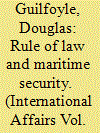| Srl | Item |
| 1 |
ID:
170258


|
|
|
|
|
| Summary/Abstract |
The transfer and deportation of ethnically Rohingya people from Myanmar into Bangladesh is a crime against humanity demanding an international response. What role, however, should the International Criminal Court (ICC) play? On 6 September 2018 an ICC Pre-Trial Chamber ruled that the Court has jurisdiction to investigate and prosecute such crimes as they are completed on the territory of a State party, Bangladesh. Myanmar is not a party to ICC Statute and has invoked the principle that treaties do not bind third parties without their consent. The case put in this commentary is that while the Pre-Trial Chamber’s approach to the law was arguable as an interpretation of the ICC Statute, it was unwise as a matter of policy. The argument is threefold. First, the Pre-Trial Chamber’s ruling is as a matter of legal method only the first-move in a process of norm-creation and persuasion. Second, it does not follow that because territorial jurisdiction in international law includes ‘objective’ jurisdiction over transboundary acts completed on a State’s territory that such jurisdiction was delegated by member States to the ICC in all cases. Finally, it is argued that international criminal tribunals do not succeed when the cooperation of necessary territorial governments (here, Myanmar) is withheld. Proceeding in this case risks becoming a quagmire of the ICC’s own creation at a time when it can little afford further risks to its legitimacy.
|
|
|
|
|
|
|
|
|
|
|
|
|
|
|
|
| 2 |
ID:
168418


|
|
|
|
|
| Summary/Abstract |
Does the rule of law matter to maritime security? One way into the question is to examine whether states show a discursive commitment that maritime security practices must comply with international law. International law thus provides tools for argument for or against the validity of certain practices. The proposition is thus not only that international law matters to maritime security, but legal argument does too. In this article, these claims will be explored in relation to the South China Sea dispute. The dispute involves Chinese claims to enjoy special rights within the ‘nine-dash line’ on official maps which appears to lay claim to much of the South China Sea. Within this area sovereignty remains disputed over numerous islands and other maritime features. Many of the claimant states have engaged in island-building activities, although none on the scale of China. Ideas matter in such contests, affecting perceptions of reality and of what is possible. International law provides one such set of ideas. Law may be a useful tool in consolidating gains or defeating a rival's claims. For China, law is a key domain in which it is seeking to consolidate control over the South China Sea. The article places the relevant Chinese legal arguments in the context of China's historic engagement with the law of the sea. It argues that the flaw in China's approach has been to underestimate the extent to which it impinges on other states' national interests in the maritime domain, interests they conceptualize in legal terms.
|
|
|
|
|
|
|
|
|
|
|
|
|
|
|
|